Reflects on osmolality - Study guides, Class notes & Summaries
Looking for the best study guides, study notes and summaries about Reflects on osmolality? On this page you'll find 400 study documents about Reflects on osmolality.
All 400 results
Sort by
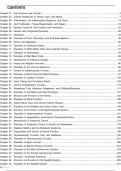 Popular
Popular
-
TEST BANK ESSENTIALS OF PATHOPHYSIOLOGY (4TH EDITION BY PORTH)
- Exam (elaborations) • 263 pages • 2024
-
- $15.49
- 2x sold
- + learn more
TEST BANK ESSENTIALS OF PATHOPHYSIOLOGY (4TH EDITION BY PORTH) CONTENTS Chapter 01 - Cell Structure and Function .......................................................................................................................... 2 Chapter 02 - Cellular Responses to Stress, Injury, and Aging .......................................................................................... 7 Chapter 03 - Inflammation, the Inflammatory Response, and Fever ..............................................
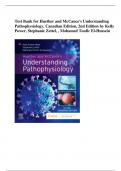 Popular
Popular
-
Test Bank for Huether and McCance's Understanding Pathophysiology, Canadian Edition, 2nd Edition by Kelly Power, Stephanie Zettel, , Mohamed Toufic El-Hussein
- Exam (elaborations) • 370 pages • 2024 Popular
-
- $46.25
- 1x sold
- + learn more
Test Bank for Huether and McCance's Understanding Pathophysiology, Canadian Edition, 2nd Edition by Kelly Power, Stephanie Zettel, , Mohamed Toufic El-Hussein Table of Contents PART ONE: BASIC CONCEPTS OF PATHOPHYSIOLOGY Unit 1: The Cell 1. Cellular Biology 2. Genes and Genetic Diseases 3. Epigenetics and Disease 4. Altered Cellular and Tissue Biology 5. Fluids and Electrolytes, Acids and Bases Unit 2: Mechanisms of Self-Defense 6. Innate Immunity: Inflammation and Wound Healing 7...
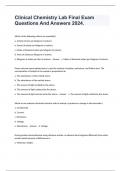
-
Clinical Chemistry Lab Final Exam Questions And Answers 2024.
- Exam (elaborations) • 33 pages • 2024
-
- $7.99
- + learn more
Which of the following reflects on osmolality? a. Activity of ions per kilogram of solvent. b. Grams of solute per kilogram of solvent. c. Moles of dissolved solute per kilogram of solvent. d. Mass of solute per kilogram of solvent. e. Kilogram of solute per liter of solvent. - Answer c. Moles of dissolved solute per kilogram of solvent. Flame emission spectrophotometry is used for analysis of sodium, potassium, and lithium ions. The concentration of analyte in the sample is prop...
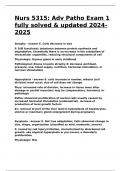
-
Nurs 5315 Adv Patho Exam 1 fully solved & updated 2024-2025
- Exam (elaborations) • 67 pages • 2024
-
- $14.49
- + learn more
A patient in respiratory distress and is breathing 33 breaths per minute. Which ABG value is consistent with the clinical scenario? PCO2 15 pH 7.30 pH 7.45 O2 sat 100% A patient who is breathing 33 breaths per minute is hyperventilating and blowing off CO2; therefore the PCO2 level will be low. The patient will most likely experience a respiratory alkalosis and the two pH values provided are not consistent with this diagnosis. A patient has a sodium level of 115 mEq/L and is disoriente...
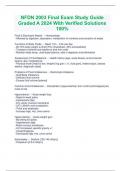
-
NFDN 2003 Final Exam Study Guide Graded A 2024 With Verified Solutions 100%
- Exam (elaborations) • 23 pages • 2024
-
Available in package deal
-
- $12.99
- + learn more
Fluid & Electrolyte Needs - - Homeostasis - Affected by digestion, absorption, metabolism of nutrients and excretion of waste Functions of Body Fluids - - Need 1.5 L - 2.5L per day - 60-70% body weight is fluid [70% intracellular, 30% extracellular] - Transport nutrients and wastes to and from cells - Maintain body temp., acid-base balance, aids in digestion and elimination Assessment of Fluid Balance - - Health history [age, acute illness, environmental factors, diet, medications] - ...
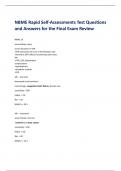
-
NBME Rapid Self-Assessments Test Questions and Answers for the Final Exam Review
- Summary • 129 pages • 2024
- Available in package deal
-
- $12.49
- + learn more
acute kidney injury acute reduction in GFR -GFR represents the sum of the filtration rate -therefore, GFR reflects functioning renal mass RFs -HTN, CKD, dehydration complications -hyperkalemia -metabolic acidosis -CKD AKI -- prerenal decreased renal perfusion hemorrhage, congestive heart failure, diuretic use osmolality > 500 FeNa+ < 1% Na+ < 20 BUN/Cr > 20:1 AKI -- intrarenal acute tubular necrosis -ischemia and toxic causes osmolality < 350 FeNa+ > 2% Na...
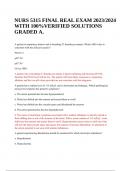
-
NURS 5315 FINAL REAL EXAM 2023/2024 WITH 100%VERIFIED SOLUTIONS GRADED A.
- Exam (elaborations) • 20 pages • 2024
-
- $12.99
- + learn more
NURS 5315 FINAL REAL EXAM 2023/2024 WITH 100%VERIFIED SOLUTIONS GRADED A. A patient in respiratory distress and is breathing 33 breaths per minute. Which ABG value is consistent with the clinical scenario? PCO2 15 pH 7.30 pH 7.45 O2 sat 100% A patient who is breathing 33 breaths per minute is hyperventilating and blowing off CO2; therefore the PCO2 level will be low. The patient will most likely experience a respiratory alkalosis and the two pH values provided are not consistent with th...
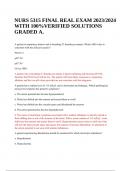
-
NURS 5315 FINAL REAL EXAM 2023/2024 WITH 100%VERIFIED SOLUTIONS GRADED A.
- Exam (elaborations) • 20 pages • 2024
-
- $12.99
- + learn more
NURS 5315 FINAL REAL EXAM 2023/2024 WITH 100%VERIFIED SOLUTIONS GRADED A. A patient in respiratory distress and is breathing 33 breaths per minute. Which ABG value is consistent with the clinical scenario? PCO2 15 pH 7.30 pH 7.45 O2 sat 100% A patient who is breathing 33 breaths per minute is hyperventilating and blowing off CO2; therefore the PCO2 level will be low. The patient will most likely experience a respiratory alkalosis and the two pH values provided are not consistent with th...
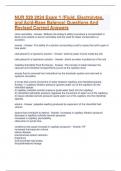
-
NUR 529 2024 Exam 1 (Fluid, Electrolytes, and Acid-Base Balance) Questions And Revised Correct Answers
- Exam (elaborations) • 7 pages • 2024
-
Available in package deal
-
- $10.99
- + learn more
NUR 529 2024 Exam 1 (Fluid, Electrolytes, and Acid-Base Balance) Questions And Revised Correct Answers Urine osmolality - Answer -Reflects the kidney's ability to produce a concentrated or dilute urine based on serum osmolality and the need for water conservation or excretion. tonicity - Answer -The ability of a solution surrounding a cell to cause that cell to gain or lose water. cells placed in a hypotonic solution - Answer -swell as water moves inside the cell cells placed in a...
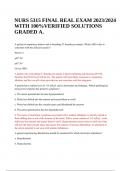
-
NURS 5315 FINAL REAL EXAM 2023/2024 WITH 100%VERIFIED SOLUTIONS GRADED A.
- Exam (elaborations) • 20 pages • 2024
-
- $12.99
- + learn more
NURS 5315 FINAL REAL EXAM 2023/2024 WITH 100%VERIFIED SOLUTIONS GRADED A. A patient in respiratory distress and is breathing 33 breaths per minute. Which ABG value is consistent with the clinical scenario? PCO2 15 pH 7.30 pH 7.45 O2 sat 100% A patient who is breathing 33 breaths per minute is hyperventilating and blowing off CO2; therefore the PCO2 level will be low. The patient will most likely experience a respiratory alkalosis and the two pH values provided are not consistent with th...
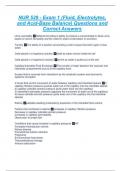
-
NUR 529 - Exam 1 (Fluid, Electrolytes, and Acid-Base Balance) Questions and Correct Answers
- Exam (elaborations) • 7 pages • 2024
-
- $8.99
- + learn more
Urine osmolality Reflects the kidney's ability to produce a concentrated or dilute urine based on serum osmolality and the need for water conservation or excretion. Tonicity The ability of a solution surrounding a cell to cause that cell to gain or lose water. Cells placed in a hypotonic solution swell as water moves inside the cell Cells placed in a hypertonic solution shrink as water is pulled out of the cell Capillary/Interstitial Fluid Exchange The transfer of water between the vascular...

How did he do that? By selling his study resources on Stuvia. Try it yourself! Discover all about earning on Stuvia


